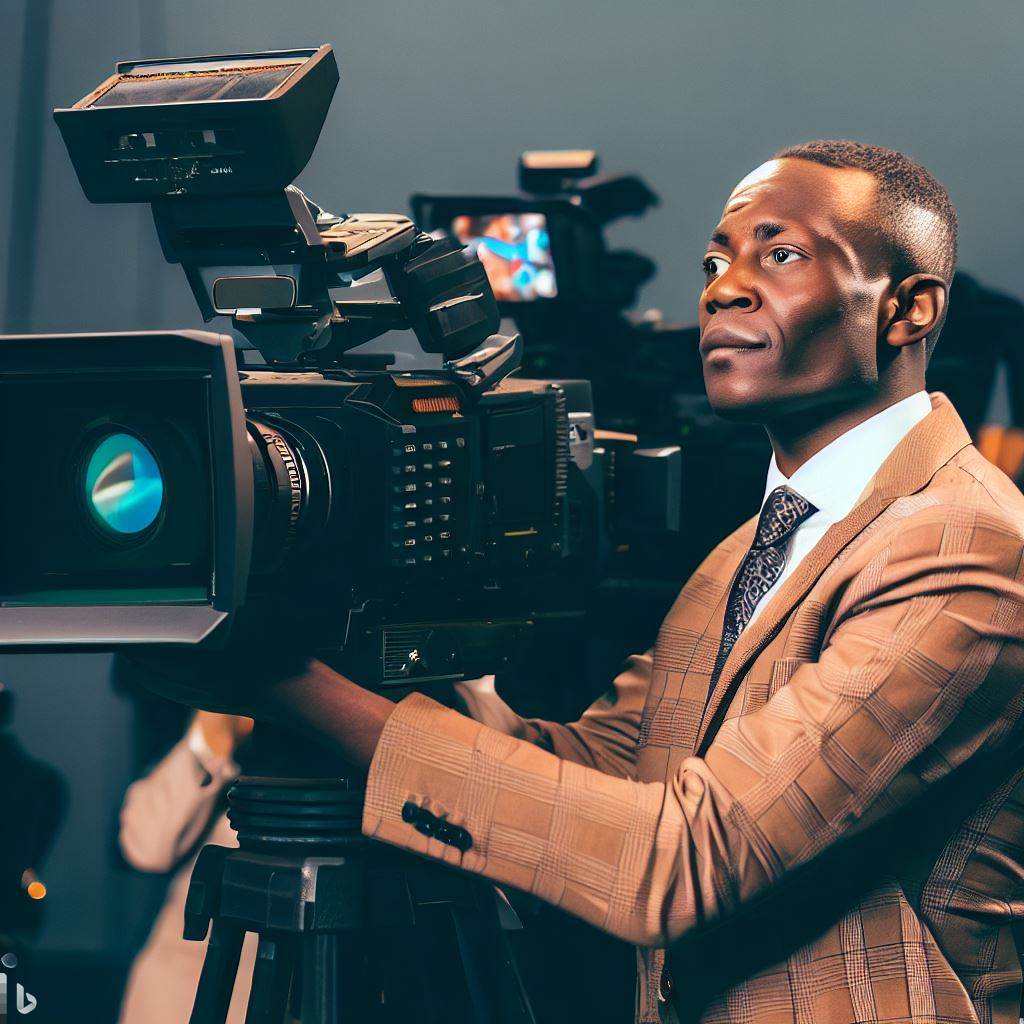Introduction
Objectivity in television reporting refers to the practice of presenting information without bias or personal opinion.
This means that reporters should strive to be impartial and report facts accurately. The importance of objectivity in television reporting cannot be overstated.
It helps ensure that the news presented to the public is accurate, credible, and fair.
By presenting information objectively, viewers can form their own opinions and make informed decisions.
Nigeria’s television reporting landscape is diverse, with numerous channels, both public and private, competing for viewership.
However, not all television stations adhere to strict objectivity principles.
Some channels tend to have political affiliations or are influenced by external factors. This can result in biased reporting and a lack of objectivity.
The Nigerian Television Authority (NTA) is the public broadcaster in Nigeria and is expected to uphold objectivity.
However, there have been instances where NTA has been accused of biased reporting, particularly during election periods.
On the other hand, private television stations like Channels TV and TVC are known for their relatively objective reporting.
In the end, objectivity is crucial in Nigeria’s television reporting. It ensures that the news presented to the public is unbiased and accurate.
While some channels strive for objectivity, others still struggle to maintain it. It is important for viewers to be discerning and seek out news sources that prioritize objectivity in their reporting.
Factors Influencing Objectivity in Nigeria’s Television Reporting
A. Political Influence
- Government regulations and media ownership shape the objectivity of Nigeria’s television reporting.
- The political affiliations of media organizations can also influence their reporting objectivity.
B. Economic Pressures
- Advertising revenue and commercial interests can impact Nigeria’s television reporting objectivity.
- The funding sources of media organizations can also affect the objectivity of their reporting.
C. Sociocultural Biases
- Tribal, religious, and regional influences play a role in shaping Nigeria’s television reporting objectivity.
- These biases can have an impact on the overall objectivity and balanced reporting in the country.
Television reporting in Nigeria, as in other nations, is influenced by various factors that impact its objectivity.
Understanding these elements is pivotal in assessing the credibility and impartiality of information conveyed by Nigerian TV channels.
A crucial factor affecting objectivity in Nigeria’s TV reporting is political interference. Media ownership and governmental regulations wield significant influence over news objectivity.
When media entities are controlled or influenced by the government, objectivity tends to align with official views, jeopardizing impartiality.
Similarly, channels affiliated with political groups often exhibit biased reporting.
Economic pressures also shape reporting. TV stations heavily depend on advertising for funding, sometimes prioritizing profit over impartiality.
Channels might cater to advertisers’ interests or avoid contentious topics that could harm business relationships, undermining objectivity.
Moreover, funding sources like corporate sponsors or government subsidies can distort reporting objectivity.
Sociocultural biases also contribute. Nigeria’s diverse tribal, religious, and regional influences can foster biased reporting.
Journalists may favor stories aligned with their backgrounds, yielding imbalanced coverage and reduced objectivity.
These biases impact reporting by amplifying certain viewpoints while marginalizing others.
Striving for objectivity, the media should ensure diverse opinions and voices to represent the nation’s issues and events more equitably.
In short, multiple factors sway the objectivity of Nigerian TV reporting—political influence, economic pressures, and sociocultural biases.
Addressing these elements is vital for a more objective and balanced representation of news and events.
Read: Top Nigerian TV Reporters and Their Success Stories
Challenges in Maintaining Objectivity
A. Limited access to information
- Government control over official data.
- Lack of transparency in public institutions.
B. Threats, intimidation, and violence
- Journalists’ safety concerns and self-censorship.
- Violence against journalists and its impact on objectivity.
C. Lack of professional standards
- Training and ethical guidelines for journalists.
- Professional organizations’ role in promoting objectivity.
Maintaining objectivity in Nigerian television reporting encounters significant hurdles, impacting news quality and credibility.
Challenges fall into three main categories: limited information access, threats/intimidation/violence, and professional standard gaps.
Limited data access hinders objectivity. Government control over official information limits accurate reporting, potentially propagating biased news.
Also, transparent public institutions are lacking, further impeding reliable journalism.
Threats and violence towards journalists form the second challenge. Safety fears lead to self-censorship, compromising objectivity.
Physical attacks and even murders not only risk lives but also create a climate of fear, undermining impartiality.
The third challenge is the lack of professional standards. Insufficient training and ethics understanding may introduce personal biases, affecting objectivity.
Professional organizations are pivotal in promoting ethics through training and standards.
Solutions require granting journalists data access, ensuring safety, and enhancing professionalism. Openness, specialized law enforcement units, and ethical guidelines can counteract these challenges.
Balancing objectivity in Nigerian TV reporting is possible with concerted efforts from government, journalists, and professional groups.
Read: The Future of Television Reporting in Nigeria
Consequences of Unbalanced Reporting
In a country as diverse as Nigeria, where different ethnic, religious, and political groups coexist, balanced reporting on television plays a crucial role in fostering unity and understanding.
However, the consequences of unbalanced reporting are significant and detrimental to society.
This section will explore the far-reaching effects of unbalanced reporting on Nigeria’s television landscape.
A. Polarization and distrust among viewers
One of the immediate consequences of unbalanced reporting is the polarization and distrust it creates among viewers.
When news outlets consistently present one-sided or biased perspectives, viewers are pushed into their ideological echo chambers.
1. Confirmation bias and echo chambers
Unbalanced reporting reinforces confirmation bias, as viewers gravitate towards information that aligns with their existing beliefs.
Over time, this leads to the formation of echo chambers, where individuals only consume, discuss, and validate opinions that match their preconceived notions.
2. Impact on public discourse and democratic participation
Unbalanced reporting hampers healthy public discourse and limits democratic participation.
When people are exposed to a skewed narrative, they might feel hesitant to engage in constructive discussions or express opinions that differ from the dominant narrative, fearing backlash or exclusion.
B. Misinformation and fake news
Another grave consequence of unbalanced reporting is the perpetuation of misinformation and the proliferation of fake news.
1. Spreading false narratives and conspiracy theories –
Unbalanced reporting can provide a breeding ground for false narratives and conspiracy theories.
In the absence of diverse perspectives, unverified or even fabricated information can easily be presented as the truth, leading to the distortion of reality.
2. Manipulation of public opinion and its implications –
When unbalanced reporting disseminates misinformation, it poses a threat to the public’s ability to make informed decisions.
Manipulation of public opinion becomes easier, leading to social unrest, electoral malpractice, and erosion of trust in institutions.
In fact, the consequences of unbalanced reporting in Nigeria’s television industry are far-reaching and pervasive.
Polarization, distrust, misinformation, and the manipulation of public opinion all contribute to the deterioration of society’s fabric.
It is imperative for media organizations to prioritize objectivity and provide viewers with diverse perspectives to foster unity, promote democratic participation, and ultimately build a more resilient and inclusive nation.
Read: Steps to Landing Your First TV Editing Job in Nigeria

Strategies for Balancing Objectivity in Nigeria’s Television Reporting
In order to achieve balanced objectivity in Nigeria’s television reporting, several key strategies can be implemented.
These strategies aim to address the various challenges that exist in the Nigerian media landscape and promote more unbiased reporting.
A. Media independence and ownership diversification
- It is important to encourage diverse sources of funding and ownership in the media industry. This would help reduce the influence of a single entity or group and promote editorial independence.
- To prevent political bias, the government must enforce stringent guidelines, ensuring media independence from political influence.
B. Journalistic integrity and training
- Ethics training should be provided to journalists to ensure they adhere to professional standards. This includes principles such as accuracy, impartiality, and accountability.
- Encouraging investigative journalism and fact-checking can help uncover the truth and prevent the dissemination of false information.
Journalists should be supported and protected when they pursue investigative stories that hold those in power accountable.
C. Audience awareness and media literacy
- Promoting critical thinking skills among viewers is essential to counteract the influence of biased reporting.
Schools and communities can implement media literacy programs to teach people to critically analyze news sources. - Educating the public on media biases and manipulation can empower them to make informed decisions about which sources to trust.
This can be done through public campaigns, workshops, and the dissemination of information on media literacy platforms.
By implementing these strategies, Nigeria’s television reporting can strive towards a more balanced and objective approach.
It requires a combination of efforts from media organizations, regulatory bodies, journalists, and the public to create a media landscape that upholds the principles of unbiased reporting and informs the Nigerian society accurately.
Read: How to Break Into the TV Reporting Scene in Nigeria
You Might Also Like: Interview with Top TV Editors in Nigeria
Conclusion
Recap of the importance of objectivity in television reporting
Objectivity in television reporting is crucial as it ensures the dissemination of accurate and unbiased information to the public.
It plays a vital role in promoting transparency, credibility, and trustworthiness in the media industry.
Summary of challenges faced in Nigeria’s television reporting
Nigeria’s television reporting faces numerous challenges, including political interference, corporate influence, and sensationalism.
These obstacles hinder the achievement of true objectivity and compromise the integrity of news reporting.
Call to action for media stakeholders and viewers to promote objectivity
It is essential for media stakeholders, including journalists, editors, and media owners, to prioritize objectivity in their reporting practices.
They should resist external pressures, maintain independence, and uphold journalistic ethics.
Likewise, viewers must demand unbiased reporting, critically analyze information, and support credible media sources.
Promoting objectivity requires a collective effort from both the media industry and the audience.
By fostering a culture of impartiality, we can enhance the quality and reliability of television reporting in Nigeria.
Let us work together to ensure a more objective and trustworthy media landscape for the benefit of our society.




